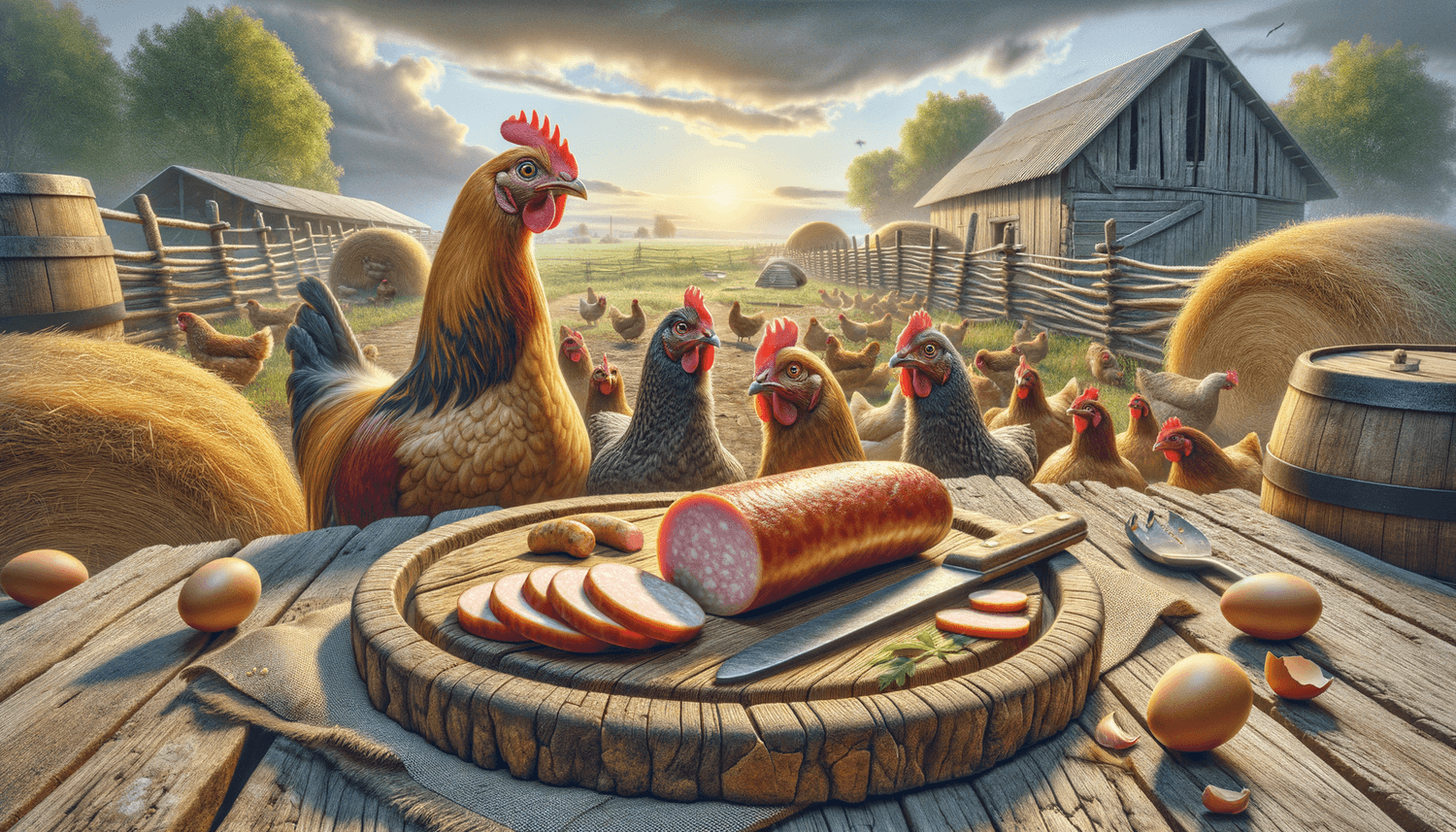Are your backyard chickens eyeing that delicious-looking sausage you’re munching on? You might be thinking, “Can my feathered friends join in on the sausage party, too?” Well, you’ve come to the right place! This blog post clucks its way into the topic, pecking at whether your hens can have a nibble of that tasty treat or if they should stick to their regular food. We’ll also scratch around the importance of balanced diets, the potential benefits and risks, and the nutritional perks of treating your chickens with occasional tasty morsels. By the end, you’ll know whether to share a link, or rather, a link of sausage with your trusty coop crew!
Can chickens eat sausage?
Yes, chickens can eat sausage, but it should be given in moderation. Although it’s not toxic to them, sausage typically contains high levels of salt and fat, which aren’t ideal for a chicken’s diet. It’s essential to provide your chickens with a balanced mix of grains, vegetables, and protein sources to ensure their optimal health and well-being.
The importance of a balanced diet for chickens
Just like us humans, chickens need a balanced diet to thrive and maintain optimal health. The mainstay of their daily meals should be a high-quality chicken feed, making up about 80-90% of their overall diet. Chicken feed is specifically designed to provide all the necessary nutrients for your flock – vitamins, minerals, proteins, carbohydrates, and fats – to keep them happy, healthy, and productive.
The remaining 10-20% of your chickens’ diet can safely consist of tasty treats like fruits and vegetables. These snacks not only give them a bit of variety and fun, but they can also help boost their overall health. Just ensure that you’re offering treats in moderation and sticking to the proper portions to avoid imbalances in their diet that could lead to potential health issues.
Nutritional value of sausage for chickens.
Feeding sausage to chickens occasionally and in moderation does provide some nutritional value. Sausage is primarily made of meat, which contains a good amount of protein – an essential component of a chicken’s diet, particularly for maintaining strong muscles, promoting growth, and supporting egg production. The meat in sausage can also supply chickens with some essential amino acids they may not get from other sources.
However, it’s important to keep in mind that sausage is not an ideal source of nutrition for chickens, given its high levels of salt and fat. Too much salt in a chicken’s diet can lead to serious health issues such as kidney damage or even death. Additionally, high levels of fat may affect a chicken’s liver, potentially causing fatty liver hemorrhagic syndrome, which can be fatal. While sausage may contribute some protein, there are healthier alternatives for protein sources that are more suitable for chickens, such as mealworms, insects, or fish meal, which provide protein without the added risks associated with high salt and fat intake.
As for vitamins and minerals, sausage doesn’t provide a substantial amount to chickens, particularly when compared to other treats like fruits and vegetables. Ideally, chickens should get their vitamins and minerals through their primary diet – a high-quality chicken feed – which is formulated to meet their specific nutritional requirements.
Nutrition table of sausage for chickens.
| Information | Description |
|---|---|
| Nutritional Value | Protein source, but high in salt and fat |
| Suggested Serving Size | Small pieces, in moderation |
| Safe Feeding Practices | Occasional treat, not a regular part of their diet |
| Preparation | Cooked sausage, no added spices, cut into small pieces |
| Potential Risks | High salt and fat content can cause health issues |
| Hydration | No significant impact on hydration |
| Digestion | Ensure the sausage is cooked and cut into small pieces for easy digestion |
| Seasonal Availability | Not dependent on season, can be fed any time of the year |
| Other Benefits | May provide essential amino acids |
Preparing sausage for your chickens
When offering sausage as a treat for your chickens, it’s important to prepare it correctly. Ensure the sausage is fully cooked and avoid feeding them raw sausage, as it can contain bacteria that could be harmful to your chickens. Additionally, refrain from using any spices, sauces, or seasonings that may be unsafe for chickens, such as onion or garlic powder, as these can be toxic to your feathered friends.
Once the sausage is cooked and free of any harmful additives, cut it into small, manageable pieces for your chickens. This will make it easier for them to peck and digest without posing a choking hazard.
Monitor their consumption and health
As with any new treat or food item introduced to your chickens’ diet, it’s essential to monitor their health and well-being after eating sausage. Observe their behavior, eating patterns, and general demeanor to ensure the treat isn’t negatively affecting them. If you notice any signs of illness or discomfort, consult your veterinarian for advice, and consider removing sausage from their diet completely.
Exploring healthier treat options
Since the nutritional value of sausages is relatively low for chickens and they carry some health risks, it’s worth exploring healthier treat options to provide an occasional reward. Treats like mealworms, insects, and vegetables can provide valuable nutrients without the downsides associated with high salt and fat content. These snacks will not only keep your flock happy but also contribute positively to their health and growth.
In conclusion, while chickens can eat sausage, it should be given in moderation and as an occasional treat to maintain their overall health. Providing your feathered friends with healthier alternatives and a balanced diet will lead to a thriving, happy, and productive flock.

















